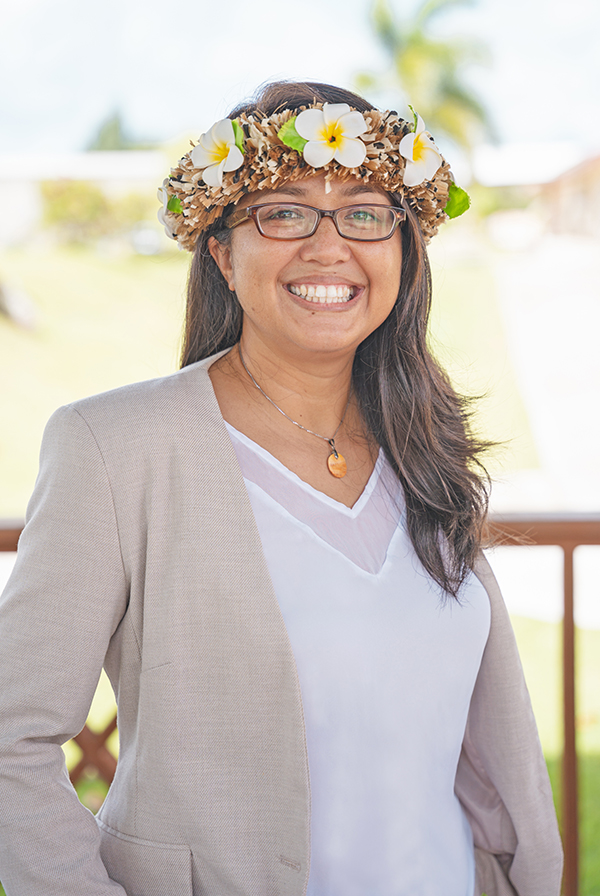‘As stewards, we contribute to enhancing our CNMI‘
Fishing and agriculture are the biggest means of livelihood in the Marianas that date back to the time of the islands’ forefathers. It provided food security, a healthy population, and good use of the fertile ocean and land that nourished marine animals, crops, and land animals.
Patricia Coleman knows this all too well and, as the first female interim dean and program leader of the Cooperative Research, Extension, and Education Services of the Northern Marianas College, she embodies commitment and expertise to move and expand the CNMI toward self-sufficiency by equipping the community with the right “know-how.”
“At CREES, I work with a team of highly motivated and competent individuals to set and strategically work toward the vision for our department in the areas of research and extension in Agriculture, Aquaculture, Food Science, Family, Community, and Youth Development, and Nutrition and Health. We ensure implementation and evaluation of the programs and projects that help us reach our vision of a CNMI ‘wherein people have the resources to grow, lead, and age with health and dignity,’” she said.
That vision includes food systems, built and natural environments, local economic opportunities, human capacity building, and building future leaders through youth development. CREES works with communities to bring about regeneration—”as stewards, we contribute to enhancing our CNMI by working with stakeholders to leave things better than we found them,” she said.
Coleman has had her share of several recognitions and she uses these to foster engagement, continue the good work, and growth. She was a recipient of the World Health Organization’s Health in All Policies Award for work with the “Tanapag, Achugao, San Roque, and As Matuis (TASA) Role Models” for significant improvements to the environments that children attend school, play, and live in.
Because of her leadership role in the original Children’s Healthy Living Program grant, she received the U.S. Department of Agriculture National Institute of Food and Agriculture Award for Integrated Research, Extension, and Education. Coleman was directly involved with providing capacity building that resulted in over 20 new diversified agroforestry plots on Saipan, Tinian and Rota after Supertyphoon Yutu. That got her recognized with the “Rising Star of Oceania” award from University of Hawaii’s Pacific Business Center Program. This recognition honors individual service and/or organizational contribution to Oceania and the world. She was also instrumental in securing over $16 million worth of competitive grants for NMC.
“I am a workaholic by nature, but I know that I need to rest in order to do my best as a leader. About two months after I became interim dean of CREES, Typhoon Yutu hit. It destroyed our research and extension facilities. Everyone at NMC has had to work extraordinarily hard to overcome that. It has definitely been a challenge and has required working double overtime often to overcome those challenges and to set NMC back on a path wherein we can best serve our CNMI,” Coleman said. “Then the pandemic hit and there wasn’t a day in that first year after the pandemic that our NMC and CREES leaders were not working every single day and at least a couple of hours during ‘non-work hours.’ It was really rough at times but it is in those moments that we show our commitment and dedication to doing the hard work that needs to be done.”
The work never stops. Coleman and her team hope to achieve many things in the first six month of this year.
“We set out to announce the architecture and engineering for the NMC-CREES Center for Research, Extension, and Development. We secured a $13.2-million grant from the Economic Development Administration to build a state-of-the-art disaster-resilient research and extension facility. After [super typhoons]Soudelor and Yutu ravaged CREES facilities, we have committed to not letting it happen again. We plan to hire and work with more professionals, scientists, and technical experts,” she said. “We also aim to complete the Plant Biotechnology lab (tissue culture) and secure the Agriculture Experiment Station in As Perdido. We cannot function as a department without a fully functioning experiment station as our work and many of our grants (including CRED) are directly tied to the experiment station. [We also need to] secure funds to jumpstart the Food Science Program to increase our local capacity to do research on local plants, create more value-added products, and to ensure the safety of all food that is sold in the CNMI. There are several more and these are a few of them,” she added.
To destress, Coleman spend time with family, exercise, read, and shut the screens/electronics off for periods of time. “I am also a board member of Paire Football Club and have been coaching youth for about 15 years or so. Soccer is another way to help promote physical activity, good nutrition, sportsmanship, and to build friendships with people who we might not typically interact with,” she said.
Whether at work or at play, the underlying energy that keeps Coleman going is a family motto that she lives by—“service above self.” In retrospect, this has helped shape her values. “I’m really grateful for all of those who have given their time to mentor and guide me: Dr. Rachel Novotny (University of Hawaii), Jerry Tan, Frankie Eliptico, Dr. Craig Elevitch and many others who continuously encourage me to reach higher and who have inspired me through their journeys of overcoming adversity and leadership. Agnes McPhetres, Tayna Belyeu-Camacho, and so many others. …My family has always believed in me and has been so supportive in the best and worst of times—my mom, dad, sister, brother, cousins, aunts, and uncles and, of course, my husband, Leo Pangelinan, and our children.”
























